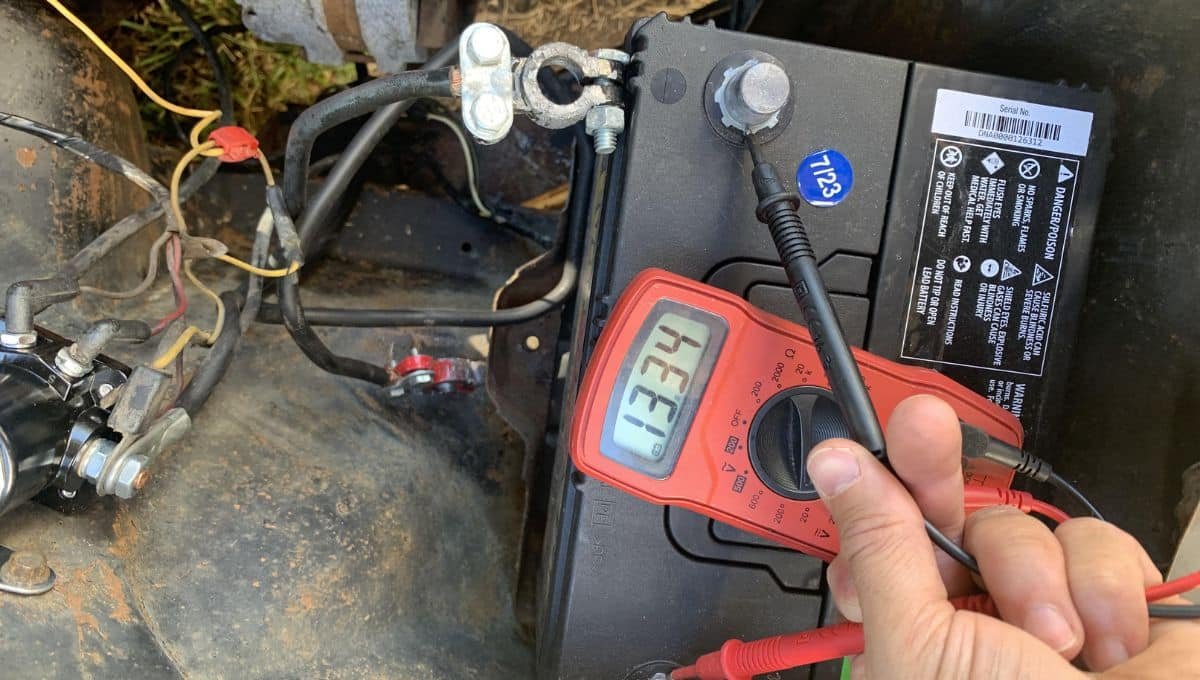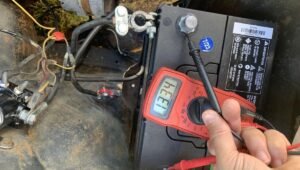Can a Faulty Car Battery Cause Your GPS Tracker to Malfunction Due to Battery – Drain and Electrical Problems?
Yes, a faulty car battery can cause your GPS tracker to malfunction. A weak or failing battery can result in power fluctuations, leading to issues like signal loss, inaccurate tracking, or complete GPS failure.
Regular maintenance and ensuring a healthy battery are key to keeping your GPS tracker working reliably.
How the Car Battery Powers Your GPS and Other Devices:

The modern vehicle is equipped with a complex electrical system that powers a multitude of devices, including your GPS tracker.
Central to this system is the car battery, which supplies power to start the engine and operate a host of electrical components. In vehicles equipped with a GPS tracker, the car battery serves as the lifeblood for its operation.
Whether you’re tracking fleet vehicles or ensuring your personal car is ready to go, the battery is vital for keeping everything running smoothly.
When the engine is off, the GPS and other systems rely solely on the battery, which means that any issue with the battery’s charge can directly impact these devices.
The Connection Between Your Car Battery and GPS Functionality:
The connection between your car battery and GPS functionality is crucial for seamless navigation and tracking. Many GPS trackers are designed to draw minimal power, but they still need a steady connection to the battery terminals for continuous operation.
When you start your car, the alternator recharges the battery, ensuring that both the GPS and other electronic components continue to function properly.
However, a weak connection or corrosion on the battery terminals can disrupt this power flow, causing intermittent GPS failures. A solid, uninterrupted connection between your battery and the GPS tracker is essential for reliable tracking.
How Electrical Power from the Battery Keeps the GPS Tracker Running:
GPS trackers are delicate devices that require a consistent flow of electrical power. Even when the vehicle’s engine isn’t running, the tracker relies on the battery to maintain its operations.
A properly functioning battery provides this constant power, keeping the GPS in tracking mode and ensuring you receive real-time updates on your vehicle’s location.
However, the GPS tracker can also slowly drain the battery when the engine is off, especially if other electronic systems are still drawing power.
Many GPS trackers are designed with energy-saving modes to prevent significant battery drain, but if the battery is faulty, even these features won’t be able to keep the tracker operational.
read also: https://techsboost.com/can-a-weak-car-battery-cause-ecu-problems/
The Impact of a Weak or Failing Battery on GPS Performance:
When your battery is weak or failing, the first signs may manifest in GPS performance. Low battery voltage alerts from the GPS tracker or an outright failure to receive signals can indicate that the battery is no longer providing sufficient power.
While a car may still start and run with a weakened battery, electronic systems like GPS trackers, radios, and alarms may start showing erratic behavior.
This is because these systems depend on consistent voltage, and when the battery can’t supply that, the GPS tracker’s ability to maintain a strong connection to satellites and transmit data is compromised.
Can a Dying Battery Affect Your GPS Signal Strength and Accuracy?
A dying battery can have a profound impact on your GPS signal strength and accuracy. Since the tracker relies on a steady power supply to maintain communication with GPS satellites, any fluctuation in power can cause the tracker to lose its signal.
This leads to inaccurate location data or, in some cases, a complete signal loss. Tracking units that constantly lose power will struggle to operate efficiently, resulting in a delayed or incorrect GPS location.
If your GPS tracker is repeatedly losing its signal, it may be time to investigate whether the battery is the cause of this malfunction.
Common Electrical Problems That Lead to GPS Malfunctioning:
One of the most common reasons for GPS malfunction is electrical problems in the vehicle. Battery drain, faulty wiring, or even a malfunctioning alternator can deplete the power necessary to keep the GPS running.
Additionally, improperly installed tracking devices or loose battery terminals can result in erratic GPS behavior. Electrical problems can cause sudden power surges or losses, which are particularly harmful to sensitive devices like GPS trackers.
It’s crucial to regularly inspect your vehicle’s electrical system to identify and resolve any underlying issues that could disrupt your GPS operation.
Signs That Your GPS Tracker Issues Are Due to Battery Drain:

There are several telltale signs that your GPS tracker issues are related to battery drain. One of the first signs is a weak or fading signal.
You might also notice that the tracker works perfectly when the engine is running but malfunctions when the vehicle is off.
Another indicator is the need to reset the clocks and radios in your car—this is often a sign that the battery is struggling to maintain power. If your GPS tracker repeatedly powers down or if you receive low battery voltage alerts, battery drain could be the root cause.
How to Identify Battery Drain in Your Vehicle Before it Affects the GPS:
To prevent GPS malfunction due to battery drain, it’s important to identify the cause early. One way to do this is by using a multimeter to measure the battery’s voltage when the engine is off. If the voltage is lower than expected, it could indicate a drain.
Another approach is to perform a parasitic drain test to identify which electronic components are drawing excessive power.
Vehicles equipped with a GPS tracker should also have battery disconnect switches to prevent unnecessary power loss when the car is not in use. Regularly checking the health of your vehicle’s battery can help avoid unexpected GPS malfunctions.
When to Blame Electrical Problems for GPS Failures:
It’s not always easy to pinpoint the exact cause of GPS failures, but electrical problems are a common culprit. If your GPS tracker frequently loses power, displays incorrect data, or fails to track your vehicle’s location, electrical faults could be to blame.
Issues such as a failing alternator, loose wiring, or even overcharging your batteries can lead to power instability that affects your GPS performance. Fleet managers, in particular, must be vigilant in diagnosing these problems to ensure reliable tracking of their vehicles.
read also: https://techsboost.com/can-a-battery-issue-cause-your-car-to-overheat/
Factors That Can Affect Both Your Car Battery and GPS Tracker:
External factors such as extreme weather conditions, frequent short trips, or excessive use of electronic devices can affect both your car battery and GPS tracker.
Cold temperatures can reduce battery efficiency, while repeated short trips prevent the alternator from fully recharging the battery.
Additionally, the use of high-powered electronic devices, such as sound systems or external lights, can strain the battery, leaving less power for the GPS. These factors combine to weaken the battery over time, causing both it and the GPS tracker to malfunction.
The Role of External Electrical Devices in Battery Drain:
External electrical devices play a significant role in draining the battery. Devices like dash cams, alarm systems, and aftermarket electronics, when continuously running, draw power from the battery even when the vehicle is off.
This parasitic draw can deplete the battery and ultimately affect GPS functionality. Over time, these electrical loads add up, weakening the battery’s ability to hold a charge and shortening its overall lifespan.
Fleet vehicles with multiple tracking units or other monitoring devices are especially prone to this issue, making it essential to manage and minimize unnecessary power usage.
How Electrical Load from Multiple Devices Can Strain the Battery and Impact GPS Performance:
When multiple electronic devices are connected to your vehicle’s electrical system, they increase the load on the battery. These devices can quickly drain the battery, especially when the engine isn’t running to recharge it.
Over time, this additional strain can deplete the battery to the point where it struggles to provide adequate power to the GPS tracker.
If your car is loaded with electronic components like in-car entertainment systems, navigation devices, and dash cams, it’s more likely to experience battery drain and GPS malfunction. Managing your vehicle’s electrical load is key to preventing these issues.
Ways to Prevent GPS Issues Caused by a Faulty Battery:
Preventing GPS issues caused by a faulty battery requires regular maintenance and a proactive approach. One of the simplest ways to prevent dead batteries is by installing a trickle charger.
Trickle chargers don’t overcharge your batteries but keep them topped off during long periods of inactivity. For fleet vehicles, solar trickle chargers are an excellent option as they ensure the batteries are charged even when the vehicle isn’t being driven.
Regularly cleaning the battery terminals and inspecting the electrical system for faults will also extend the life of your battery and help maintain consistent GPS functionality.
How to Prevent Dead Batteries from Disrupting Your GPS Tracker:
To prevent dead batteries from affecting your GPS tracker, it’s important to keep your vehicle’s battery in good condition. Simply starting your car weekly can help recharge the battery and ensure the GPS continues to operate efficiently.
Installing a low battery voltage alert can also notify you when your battery is running low, allowing you to take action before it’s too late.
Battery disconnect switches are another useful tool, especially for vehicles that sit idle for long periods, as they prevent parasitic drains from depleting the battery entirely.
Simple Maintenance Tips to Extend Battery Life and Ensure Consistent GPS Functionality:
Regular battery maintenance is key to extending its life and ensuring consistent GPS functionality. Fleet managers should ensure that batteries are regularly inspected, terminals are kept clean, and the alternator is working efficiently.
Additionally, avoid overcharging your batteries, as this can damage their ability to hold a charge. When not in use for long periods, use battery disconnect switches or trickle chargers to maintain optimal battery levels.
Following these steps will not only prolong the life of your battery but also keep your GPS tracker operating reliably.
What to Do If Your GPS Malfunctions Due to Battery Problems:

If your GPS malfunctions due to battery problems, the first step is to test the battery’s voltage. Low voltage is often the primary factor in GPS issues. If the battery is to blame, replacing it with a new one is the best course of action.
In some cases, resetting the GPS tracker after installing a new battery can resolve lingering issues. However, if the GPS continues to malfunction, there may be deeper electrical problems that require professional assistance.
How to Diagnose Whether the Battery Is to Blame for Your GPS Issues:
To diagnose whether the battery is responsible for GPS issues, check the vehicle’s battery voltage with a multimeter. If the reading is below 12.4 volts when the engine is off, the battery may not be supplying sufficient power.
Additionally, observe if other electronic components, such as radios or lights, are also showing signs of failure. These are strong indicators that the battery is at fault.
If you suspect deeper electrical problems, consider having a technician inspect the wiring and alternator for faults.
Effective Solutions to Fix Both Battery and GPS Problems in Your Vehicle:
The most effective solution to resolve both battery and GPS problems is regular maintenance. This includes ensuring that the battery is properly charged, the terminals are clean, and the electrical connections are secure. Installing a low battery voltage alert or a trickle charger can also help prevent future issues.
If your GPS continues to malfunction despite a healthy battery, consider checking the tracker’s wiring or replacing it with a newer model. Addressing both the battery and GPS as interconnected systems ensures long-term reliability.
read also: https://techsboost.com/can-a-failing-battery-affect-your-cars-fuel-pump/
FAQ’s
1. Can a weak or failing car battery affect my GPS tracker?
Yes, a weak or failing car battery can lead to GPS tracker malfunctions, including signal loss and inaccurate data, as the tracker relies on a steady power supply.
2. How can battery drain affect my GPS tracker’s performance?
Battery drain can cause the GPS tracker to lose power when the vehicle is off, leading to issues such as a weak signal or a complete failure to transmit location data.
3. What are the signs that my GPS issues are due to battery problems?
Signs include low battery voltage alerts from the GPS tracker, weak or fading signals, and devices like radios resetting or malfunctioning when the vehicle is off.
4. How can I prevent battery-related GPS malfunctions?
Regularly maintain your battery, clean terminals, and install tools like trickle chargers or battery disconnect switches to prevent battery drain and ensure a steady power supply.
5. Can electrical problems in my vehicle cause GPS malfunctions?
Yes, electrical issues like faulty wiring, a failing alternator, or loose battery terminals can disrupt the power supply to your GPS tracker, causing it to malfunction.
Conclusion:
Maintaining the health of your vehicle’s battery is critical for the smooth operation of your GPS tracker. Whether you’re managing fleet vehicles or relying on your personal car’s GPS for navigation, keeping your battery charged and addressing electrical issues early will prevent costly disruptions along the way. Regular maintenance, careful monitoring, and proactive solutions like trickle chargers and voltage alerts will ensure that your GPS tracker remains operational, keeping you on the right track.
Read also:
https://techsboost.com/what-to-do-when-your-car-battery-gets-too-hot/
https://techsboost.com/how-to-identify-battery-related-issues-in-older-vehicles/
https://techsboost.com/can-using-too-many-accessories-at-once-drain-your-battery/
https://techsboost.com/can-using-aftermarket-parts-cause-battery-drain/














Post Comment